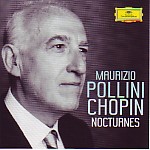Claudio Arrau claimed that the Nocturnes counted among the deepest, most searching of Chopin’s works. Whether or not Maurizio Pollini agrees, his intense, serious, and completely thought-through interpretations have little to do with moonlit introspection and salon-like charm. Whereas Arrau’s highly rhetorical style tugs and probes between the music’s lines, Pollini’s relatively brisk tempos largely proceed in straightforward, long-lined arcs, with discreet yet purposeful rubatos. The F-sharp Op. 15 No. 2 Nocturne is a case in point, and it reveals much more effective this piece is when it walks (like Josef Hofmann’s incomparable 1935 HMV test pressing) rather than drifts. At the same time, Pollini rarely misses important inner voices or counter melodies buried within the floating arpeggiated left hand accompanying patterns.
He is not averse to unleashing climaxes with a hard-hitting impact that can sound harsh and tonally undifferentiated in his concert performances, but not at all on disc. For example, the central episodes of Op. 15 No. 1 and Op. 55 No. 2 are appropriately agitated, yet Pollini still accounts for each note in its proper perspective. Listen to Op. 62 No. 1’s fluttery trills, Op. 27 No. 2’s gorgeously sculpted right-hand cantabile, and Op. 37 No. 2’s super-supple double thirds, and you’ll experience Pollini’s ironclad technique on rare form.
Of course, there are other valid options. On Cascavalle, Aldo Ciccolini recalls the expansive calm of Rubinstein’s mid-’60s stereo versions, and Ivan Moravec’s epic poetry refuses to cede its reference position. I also retain a fondness both for the slightly offhand, improvisatory aura Maria João Pires casts in DG’s previous Nocturnes cycle and for Earl Wild’s big-boned, grand-manner pianism (on Ivory Classics).
That said, Pollini realizes his conceptions with masterful authority and a sense of involvement that his recordings don’t always convey. I’d go so far as to say that the Nocturnes add up to Pollini’s finest recorded Chopin since his 1972 Etudes and 1960 E minor concerto. Like Moravec and Rubinstein, Pollini complies with the “traditional” canon of 19 Nocturnes and leaves out the posthumously-published C-sharp minor and C minor pieces available elsewhere. DG’s slightly distant, roomy, yet crystal-clear engineering appeals to me less than the close-up detail and warmth of the Arrau, Rubinstein, and Moravec Nocturne sets.
































